Difference between revisions of "Verbesina alternifolia"
Bull. Torrey Bot. Club 20: 485. 1893.
FNA>Volume Importer |
FNA>Volume Importer |
(No difference)
| |
Revision as of 18:47, 24 September 2019
Plants (30–)100–200+ cm (perennating bases ± erect or horizontal rhizomes, internodes winged, at least proximal). Leaves all or mostly alternate (proximal sometimes opposite); blades lance-elliptic or lanceolate to lance-linear, 10–25+ × 2–8+ cm, bases narrowly cuneate, margins coarsely toothed to subentire, apices attenuate, faces scabrellous. Heads (3–)8–25(–50+) in corymbiform to paniculiform arrays. Involucres ± saucerlike, 10–12+ mm diam. Phyllaries 8–12+ in 1(–2) series, ± spreading to reflexed, spatulate or lance-linear to linear, 3–8+ mm. Ray florets (2–)6–8+; laminae 15–25+ mm. Disc florets 40–60+; corollas yellow. Cypselae dark brown to black, oblanceolate to ± orbiculate, 4.5–5 mm, faces sparsely hirtellous to glabrate; pappi 1.5–2 mm. 2n = 68.
Phenology: Flowering Aug–Oct.
Habitat: Alluvial flats, along streams, woodlands
Elevation: 10–600 m
Distribution

Ont., Ala., Ark., Del., D.C., Fla., Ga., Ill., Ind., Iowa, Kans., Ky., La., Md., Mich., Miss., Mo., Nebr., N.J., N.Y., N.C., Ohio, Okla., Pa., R.I., S.C., Tenn., Tex., Va., W.Va., Wis.
Discussion
Verbesina alternifolia may be no longer present in Delaware.
Selected References
None.